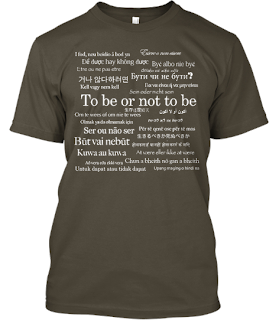When news came out a few weeks back about a new "Star Wars in the style of Shakespeare" book, Bardfilm and I were alerted to another author's existing effort in this space. Tom Brown's So Long, Shakespeare was pitched to me as a book about Star Wars crossed with the authorship question, and I made the author promise me that it ended the right way before I'd review it. True story. :)
I enjoyed the book, and there's at least one moment where I swore, loudly and repeatedly, at my car's stereo speakers as they played the audiobook at me, I was that upset with something that was said. That either says something about how well Brown knows how to push buttons, or how easy mine are to push.
The story starts with Joe Seabright, an obvious George Lucas clone, who made his fame and fortune penning five space opera films heralded the world over as the greatest space saga ever conceived. Legions of fans buy the merchandise, attend the conferences, and see his movies over and over again. His company JoeCo has invented new ways to film and present his movies, and his fortune has allowed him to build his own city, JoeTown. Every time one of his films come out he's a shoe-in for the best special effects award and best musical score, but the best picture award eludes him.
So far it screams George Lucas / Star Wars, and you don't even have to suspend your disbelief that much. Even when the story opens with Seabright in tears, so upset over yet again failing to win his Oscar, you can imagine Lucas doing the same thing.
Then it gets crazy. I'm not going to say you need to suspend disbelief for this one. You need to lock up disbelief in a glass case with David Blaine and Kris Angel and suspend it a half mile above New York City, without airholes, for the duration of this ride.
Everyone who works for Joe has an intervention to let him know that the weakest part of the stories has always been the writing. He sucks, worse than he could ever imagine. No fear, however! There's a solution. JoeCo has enough brainpower on staff that one of their scientists has managed to extract the "muse" gene from DNA and replicate its function (in pill form, no less). So you get the DNA of the person whose creative streak you wish to emulate, take your pill, and you can immediately write (or sculpt or paint...) in the style of that person.
Bring on the Shakespeare! Why not? The guy that made his fortune writing space battles naturally thinks that he's almost Shakespeare anyway, and just needs a little boost. Oh, of course you have to accept that in this world there's a DNA database of all the greatest people in history, Shakespeare included.
Let's just say the results do not go as expected, and it's not long before the authorship question (and an entire committee of people who've made it their lives' work to have the debate) comes up. In response to the DNA method of reproducing creativity comes a mathematical formula for measuring creativity, and a quest to find not merely a replica of history's greatest creative mind ... but the greatest *living* creative mind. Shakespeare vs ... who? [ Hey, Disbelief, how you doing up there in that cage? Can you breathe? Is David Blaine annoying you yet? ]
This is science fiction first and foremost, it's not Shakespeare scholarship, and you have to approach it that way. I found it fun. I did figure out the mystery before it was revealed, but there were plenty of times that I thought it was going to go one way and it didn't. Most importantly, it all works out. There are plenty of times when you'll think the author took the easy route, or is going to follow the story through to a particular conclusion, and you're almost always going to be wrong.
I still refuse to legitimize the authorship question, even after discussing it with the author (who is probably listening and may jump in on the comments :)). I did not come away from this book thinking, "Yes, I have new insight into the question." Nope. I was a Stratford man when I started that book, I was a Stratford man when one of the book's characters used the expression "Stratford half-wit" and I let out a stream of curses that only stopped when I reminded myself that this is a fictional character saying this, that no real people think that :), and I'm a Stratford man at the end. That doesn't mean it's not a fun book that I think Shakespeare geeks who are at least part science fiction geek would enjoy.
This year's Shakespeare Day Celebration is sponsored in part by Shakespeare Is Universal: Shakespeare truly is for everyone, and nothing demonstrates that sentiment better than his most famous quote of all, translated here into languages from around the world. In celebration of Shakespeare's birthday, show that you believe his works are just as relevant, powerful and important as they've ever been!








